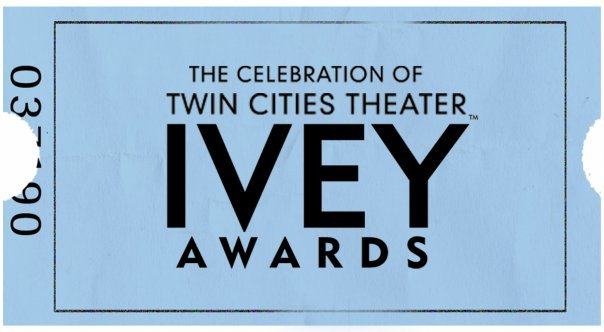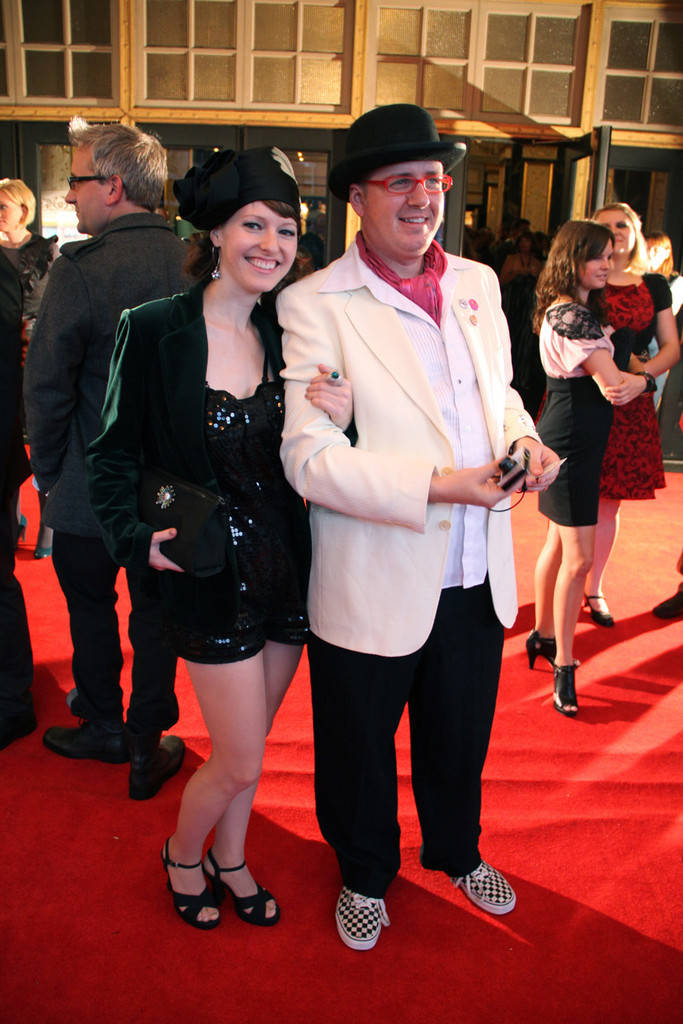What’s Missing from the Iveys
Playwright Max Sparber muses on the annual pomp and ritual of the Ivey Awards. Specifically, with all due props to the local talent recognized by the Iveys, he wonders who gets left out of the running altogether and what it really means to new theater.


THE IVEY AWARDS ARE A PRETTY LAVISH AFFAIR — this year they were held at the luxurious State Theater in downtown Minneapolis, where a red carpet awaited guests, who were photographed by a throng of paparazzi as they entered. I have it on good authority that at least a few of those paparazzi were hired actors, but what does that matter? This is theater we are discussing, after all – such things are all about stage and setting, and an award show should have paparazzi at the door. If they won't show up on their own, why not go ahead and hire a few?
Some of the photographers appeared to be the real thing — or, at least, real enough to take my photograph, which showed up on Minneapolis St. Paul Magazine's Party Patrol blog. That's me at the top of the page, in a bowler derby, sitting next to Sarah Scrimshaw of the Joking Envelope company. We were at the lush pre-party at The Forum restaurant, a rather dazzling deco-styled eatery that wouldn't look out of place in the film version of The Untouchables. Scroll down the Party Patrol blog, and you'll see the full photo, as part of a slide show of attendees. Cropped out of the photo is Joseph Scrimshaw, Sarah's husband. I mention this because although I may occasionally be so indiscreet as to have drinks with another man's wife, I am not so foolish as to get photographed doing it.
I also wound up photographed on the red carpet with my actual date, which showed up on Metromix. And then we went into the theater, for the main event — a show hosted by "local actor/legend Wendy Lehr and the Jungle Theater's Bain Boehlke," as the publicity materials said. One caveat here: There was a remote possibility I might have won an Ivey this year. I have written several plays with Off-Leash Area, and they are one of the theaters which are eligible for Ivey Awards. I didn't win, and didn't expect to, but I should mention the fact for the sake of full disclosure.
I won't mention who won what. It's a week after the fact, and, if you're curious about the winners, the full list of this year's honorees is easy to look up. Instead, I'd like to discuss the question of eligibility. The Ivey Awards are particular about what qualifies for consideration each year — you can find the list of criteria on their Wikipedia page. This is not intended as a critique of the Iveys, as they are free to set their own rules and standards for recognition. But I am interested in exploring what gets left out. Firstly, the Iveys won't award prizes to any company that is not a 501(c)(3) organization, or conversely, which has been a for-profit business for less than a year. Secondly, in order to qualify for Ivey recognition, these companies must "compensate their artists and staff on a regular basis." And what gets left behind by this?
______________________________________________________
The Iveys tend to focus on fairly established Twin Cities companies and performers. As deserving as these artists may be, one wonders if the very nature of this set-up, and the awards' restrictive eligibility criteria, ensures that the work celebrated by the Ivey Awards seems a bit dated.
______________________________________________________
A lot. Fringe shows, in particular, are often not going to fit into either of these standards — they tend to be produced by nonprofessional companies with no official standing, which have sprung up for the sake of putting on a single Fringe show. That's also true of many of the shows at Bryant-Lake Bowl — and perhaps I should mention here that I have a show at the Bryant-Lake Bowl, although it's produced by an LLC and pays its performers; so, in eight months, when my LLC has been around for a year, I suppose we will be eligible for an Ivey, too.
Are such restrictive criteria for eligibility really an issue? I suppose that all depends on what's being celebrated. The Iveys tend to focus on fairly established Twin Cities companies and performers, and god knows Wendy Lehr, who won a lifetime achievement award last Monday, has put in her time and deserves whatever laurels come her way.
That said, one still can't help but wonder if this setup makes the work celebrated by the Ivey Awards seem a bit dated. Looking over the past winners, in 2004, the first year of the Iveys, awards were handed out to The Miser by Molière (written in 1668), Death of a Salesman (1949) and La Boheme (1896). It's worth mentioning that an award was also given to Off-Leash Area, the company I work with, for an original production titled PSST!, but it was the only award given that year for a completely original show. Since then, the awards bestowed have proceeded along similar lines — the recognized "best productions" are almost always dominated by older, and sometimes ancient, plays. This year's winners included Othello and Mary's Wedding, and while the latter may be unfamiliar to local audiences, its first production was mounted more than a half-decade ago. The newest play honored this year was Ruined, which is three years old and took the Pulitzer in 2009 for Drama. Well, there was a newer play, sort of — Illusion Theater debuted Allison Moore's newly scripted stage adaptation of My Antonia, but the source material, Willa Cather's famous novel, dates back to 1918.
Stage performances for the Iveys show this year included a parody of A Chorus Line and a scene from Rent, as well as a group of kids doing a hip hop-ified version of, if I recall right, "The Sun Will Come Out Tomorrow" — none of which is, to put it delicately, precisely new material. Now, the Iveys don't claim to be a celebration of new theater, so it's not fair to fault them for it — but all the same, as a matter of fact, the awards are not a celebration of new theater.
I won't demand that the Iveys become such a thing, but something sure needs to be. Because small theaters, and new theaters, and theaters that do things on the cheap, are the crucibles for new plays; they need a champion and deserve to be celebrated. But these are exactly the sorts of plays that are likely to be overlooked by the Ivey Awards, because they fall outside the eligibility requirements for recognition.
Ultimately, this means that when the Twin Cities theater community celebrates itself, it does so halfway, represented by only a fraction of its constituents. An outsider to the Twin Cities, attending the Iveys, would think this is a town that doesn't produce much new theater, or at least much locally generated theater. Further, the line-up of award recipients would give the sense that even if we do create new work, we must not value it or find it worthy of particular celebration. And that's not the case — at least, I hope it's not.
______________________________________________________
About the author: Max Sparber is a journalist and playwright. He has enjoyed over 30 productions of his plays, and, in the past year, has started producing theater, musical and literary events as one of the founders of Freaky Three-Way LLC. He can also frequently be seen as the lead singer for his Celtic punk band, The Peter O'Tooles.